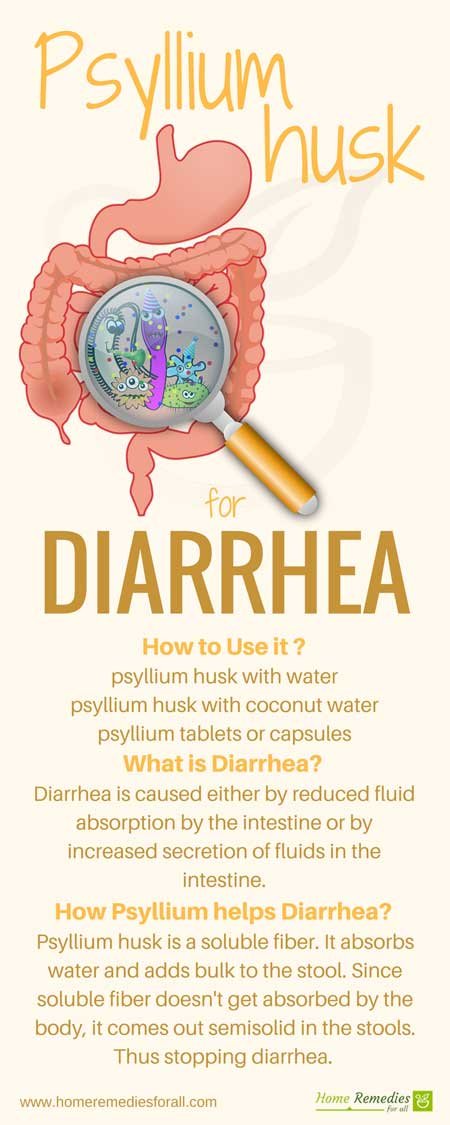Diarrhea means either you are getting loose stools or frequency of your stools has increased or both. Sometimes your stools can be totally watery.
Diarrhea is caused either by reduced fluid absorption by the intestine or by increased secretion of fluids in the intestine.
It can be an acute or chronic diarrhea depending on its symptoms. You may get abdominal pains and cramping in addition to frequent watery stools.
You lose electrolytes so feel dehydration. There are home remedies like psyllium for diarrhea and other soluble fiber rich foods that can stop it and give you relief. Psyllium husk is sometimes even recommended by doctors for your diarrhea.
Table of Contents
- What is Psyllium?
- How Psyllium Husk Help Diarrhea?
- How to Use Psyllium for Diarrhea?
- Precautions and Tips
What is Psyllium?
Psyllium is a soluble fiber made from seeds of Plantago ovata plant. Largely cultivated in India but now widely cultivated around the world, psyllium is most commonly known as a natural laxative.
Since it helps to get rid of constipation , it automatically becomes a good remedy for hemorrhoids. No constipation, no hemorrhoids.
It is also a good remedy for irritable bowel syndrome (IBS), Crohn's disease and diarrhea.
As a prebiotic psyllium also assists the probiotics colonies to grow in the digestive system which keeps the balance of bacteria in the guts. It reduces bloating and flatulence.
It also helps to reduce cholesterol.
The list of benefits doesn't stop here. Psyllium helps to control blood sugar and is also a good remedy for weight loss.
You can easily get psyllium in powder, tablets, capsules and liquid forms in groceries, pharmacies or chemist shops.
How Psyllium Husk Help Diarrhea?
Treating diarrhea is just not restricted to stopping the watery stools. It also involves replanshing the lost minerals in diarrhea and resulting dehydration.
Psyllium husk does the first part of the job. It bulks the stool and stops diarrhea. You still need to replenish lost electrolytes and water by other methods.
In fact for all kinds of diarrhea treatments, be it a prescription medication or home remedy like use of psyllium, you always need to replenish lost electrolytes by additional treatment. The remedies that stop diarrhea can't replenish lost electrolytes.
Psyllium is a soluble fiber which is not absorbed by the body. So it passes through your stools without adding any nutrients.
But it absorbs fluids as a result it adds bulk to the stools.It is this capability of psyllium and other soluble fibers to convert watery stools to solid bulk stool helps to stop diarrhea.
Psyllium is used for both constipation and diarrhea. For diarrhea it creates the bulk by absorbing fluids and constipation it softens the hard stools.
How to Use Psyllium for Diarrhea?
You can use psyllium husk, powder or capsules in the following ways to stop diarrhea.

1. Psyllium Husk or Powder with Water
This is the most common way of using Psyllium for diarrhea.
- Take one glass of water
- Add half teaspoon of rock salt ( this will help in replenishment of electrolytes)
- Add one teaspoon of Psyllium husk or powder
- Mix well. It will begin to form a gel like consistency.
- Consume immediately
Do it 2-3 times a day to stop your diarrhea.
Above doses are for adults and children above the age of 12. For children below 12 reduce the psyllium quantity to half teaspoon.
2. Psyllium Husk with Coconut Water
Coconut water is rich in electrolytes so adding psyllium husk to it will do both the job of stopping diarrhea and replenishing electrolytes at the same time.
- Take out fresh coconut water from a big watery coconut. It should be one glass
- Add 1 teaspoon psyllium husk or powder and mix well
- Drink as soon as it begins to look like a gel consistency.
- You can do it 2-3 times a day or more.
3. Psyllium Capsules or Tablets
If you don't get psyllium husk or powder then you can use it in a tablet or capsules form whatever is available.
Different brands will have different amounts in the capsule so follow the instructions on the box.
It is a good idea to keep a package of psyllium husk in your kitchen to make it available when required. Constipation and diarrhea episodes happen without any warnings.
Precautions and Tips
Psyllium has been generally found safe in various scientific experiments. However, it may not be suitable for some people.
Psyllium:
- may cause allergies in some people. If you see rashes and other allergic symptoms then don't use psyllium.
- takes away many nutrients like zinc, phosphorus, iron and calcium along with it, since it is a water soluble fiber and doesn't get absorbed by the body, So, use psyllium occasionally. Do not make it a habit.
- reduces absorption of essential nutrients as it moves fast in the bowels and excretes the food fast. As the food doesn't remain long enough in the intestine then the nutrient absorption is reduced.
- may cause blockage of gastrointestinal tract particularly if the diarrhea is gone and you still take psyllium. In this case since there is not enough water it draws water from the body and blocks the tract.
The bottomline is, use psyllium with restraint to stop diarrhea. Don't over consume it.

